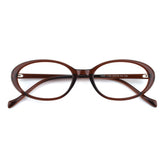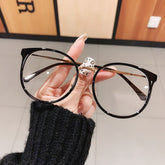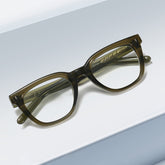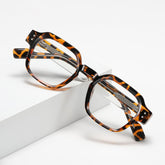Do my glasses need anti reflective coating?
Have you ever noticed distracting reflections or glare on your glasses lenses when you put them on? This not only affects your vision clarity but also makes it harder for others to see your eyes clearly. To solve this, an anti-reflective (AR) coating is the perfect solution. It reduces reflections on both sides of the lens, allowing more light to pass through and giving you clearer vision. In this blog, we’ll explore five key points about anti-reflective coating that you should know to enhance your eyewear experience.
- What Is Anti-Reflective Coating?
- What Anti-Reflective Coating can Benefit for Glasses?
- Who Should Get Anti-Reflective Coating?
- Does Sllac Offer Anti-Reflective Coating?
- Any Other Kinds of Lens Coatings do Sllac Have?
1. What Is Anti-Reflective Coating?
Anti-reflective coating, also known as AR or anti-glare coating, is a thin, invisible layer applied to the surface of your lenses. The primary function of this coating is to reduce the amount of reflection on the lenses, allowing more light to pass through for clearer vision. Without AR coating, your lenses can reflect a significant amount of light, creating glare and making it harder to see in certain conditions.
2. What Anti-Reflective Coating can Benefit for Glasses?
- Improved Vision Clarity: AR coating helps to eliminate the reflections that can obstruct your vision, especially when looking at bright lights or screens. This is particularly useful for tasks like reading, working on the computer, or driving at night.
- Reduced Glare: Glare from bright lights, such as headlights, sunlight, or overhead lighting, can be distracting and uncomfortable. Anti-reflective coating minimizes this glare, making your glasses more comfortable to wear in various lighting conditions.
- Better Night Driving: One of the most notable benefits of AR coating is its ability to improve night driving. It reduces the glare and halos caused by oncoming headlights, giving you sharper, clearer vision in low-light conditions.
- Enhanced Aesthetics: Glasses with anti-reflective coating also look better. Since the coating reduces reflections on the surface of your lenses, it makes your eyes more visible to others. This creates a clearer, more natural appearance, both in person and in photos.
- Reduced Eye Strain: Anti-reflective coating can help reduce eye strain by allowing more light to reach your eyes. This is especially beneficial for those who spend long hours staring at digital screens or working in environments with harsh lighting.
3. Who Should Get Anti-Reflective Coating?
While AR coating offers advantages for most people, it is particularly beneficial for certain individuals. Here’s how to determine if you should invest in AR-coated lenses:
- Frequent Digital Screen Users: If you work in an office or spend hours each day looking at a computer, phone, or tablet, you’ll likely benefit from the glare reduction AR coating provides. It can help reduce headaches, dry eyes, and general discomfort caused by prolonged screen time.
- Night Drivers: If you frequently drive at night, AR coating can make a significant difference by reducing the halos and glare caused by streetlights and headlights. This improves both your comfort and safety while driving after dark.
- People in Bright or Fluorescent Lighting: Individuals who work or spend a lot of time in environments with bright artificial lighting can benefit from AR coating’s ability to minimize reflections. This allows you to focus more easily and reduces the discomfort caused by harsh lights.
- Individuals with High Prescriptions: If you have a strong prescription, your lenses may naturally reflect more light due to their thickness. AR coating helps counteract this by making the lenses more transparent and less reflective, giving you clearer vision and reducing the thickness's impact on light reflections.
4. Does Sllac Offer Anti-Reflective Coating?
All lens packages we offer come with anti-reflective coating, except for the "frame only" option. Additionally, every lens option includes anti-scratch and UV-protective coatings, so you don't have to worry about selecting these options separately. We've got you covered for optimal clarity, durability, and eye protection with each lens choice.
5. Any Other Kinds of Lens Coatings do Sllac Have?
Except anti reflective coating, we do provide some other coatings to suit for different lifestyle needs, including scratch-resistant coating, UV protection coating, anti-fog coating and hydrophobic (water-repellent) coating.
- Scratch-Resistant Coating: Also known as anti-scratch coating. Protects lenses from everyday scratches. Essential for both plastic and high-index lenses, which tend to scratch more easily than glass.
- UV Protection Coating: Blocks harmful ultraviolet (UV) rays. Important for preventing eye damage from prolonged sun exposure. Some lenses, like polycarbonate, inherently block UV rays, while others need this coating.
- Anti-Fog Coating: Prevents lenses from fogging up in cold weather or while wearing face masks.Useful for sports or transitioning between different temperature environments. Our Anti blue lens options will include this coating for you to add.
- Hydrophobic (Water-Repellent) Coating: Repels water, sweat, and oils. Keeps lenses cleaner for longer by preventing smudging from fingerprints or moisture.
Anti-reflective coating is a valuable addition to most glasses, offering improved vision clarity, reduced glare, and enhanced comfort. Those who drive at night, work on screens, or spend time in bright environments will more likely benefit from AR-coated lenses. If you still cannot decide if you need them or have questions about choosing the right lens, consider your specific needs and consult with your optometrist to determine what is right for you.












